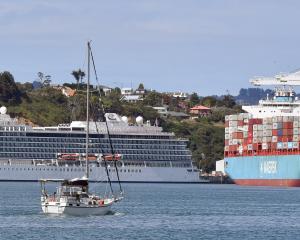
The cost of the clean-up after last year's significant flooding in eastern Otago and Canterbury has more than doubled to nearly $55 million, prompting fresh calls to help councils tackle climate change.

The storm, from July 20 to 22, brought more than 100mm of rain in 24 hours, inundating more than 2000 homes in settlements south of Dunedin, as well as in Christchurch and Timaru.
The rain also caused millions of dollars' damage to roads as slips came crashing down and road surfaces were stripped away.
Yesterday, authorities confirmed to the Otago Daily Times the estimated cost of the storm had more than doubled, from about $25 million in August last year to nearly $55 million.
The figures comprised costs incurred, or expected to be incurred, by the Dunedin City Council, Otago Regional Council and New Zealand Transport Agency, as well as insurance claims received since the event.
Dunedin Mayor Dave Cull said the DCC's share of that bill - estimated to be up to $20 million - was "a fair bit to swallow'', even if covered by insurers or NZTA subsidies.
Mr Cull, who is president of Local Government New Zealand, said it also highlighted the challenges faced by other councils, many of which lacked the resources to adapt to the risks associated with climate change.
With more severe storms expected more frequently if climate change predictions played out, LGNZ was promoting the idea of a Local Government Risk Agency to do the work for councils.
"We've really got to get ahead of this,'' Mr Cull said.
It was a view shared by Insurance Council chief executive Tim Grafton, who said last year's storm was the third-most expensive weather event in 2017.
"This highlights the importance of undertaking adaptation work to combat the effects of climate change.
"The sooner we start addressing and combating issues like rising sea levels and increased frequency of extreme weather events, the lower the risk we will face in future from a comparable event,'' Mr Grafton said.
In Dunedin, the city council's costs from last year's flooding had jumped from $1.5 million in August last year, as work to repair damaged roads, bridges and pipes had continued, council transport group manager Richard Saunders said.
The costs now included up to $12 million for patching the city's road network, including replacing the Sutton bridge and repairing others.
They also included up to $8 million in repairs to the city's water infrastructure, council 3 Waters manager Tom Dyer said.
The value of insurance claims from the flooding had also jumped, from $20.86 million to $31.2 million, after 3345 claims were received, Insurance Council figures showed.
The Otago Regional Council's costs had also nearly doubled, from $700,000 to $1.27 million, a spokeswoman said.
The NZ Transport Agency had spent $2.5 million fixing its network, although the final bill was down from earlier estimates, which predicted costs of at least $3.7 million, NZTA senior network manager John Jarvis said.
Mr Saunders said the NZTA would also fund about 70% of repairs to Dunedin roads and work had begun in Blueskin Rd and at Taiaroa Head.
Contractors would soon shift to other sites, including slips at the Southern Cemetery, Second Beach and Hatchery Rd, as well as taking care of a "significant amount'' of smaller repair work.
Reinstating the Sutton bridge was included in the estimated costs but was also being treated as a stand-alone project.
The "significant package of work'' was now not expected to be complete until June 30, almost a year after the downpour, he said.
That was faster than the two years spent cleaning up after the city's 2015 flood, and "quite a task with the amount of work that needs to be done''.
"But that's the target we're aiming for,'' he said.
Comments
As the sea levels rise the bills for repairs and replacement of roads will increase every year. Nationals roads plan would cost over $10 billion.
We must now be careful and not overspend on new roads that are not necessary.
64% of NZers want more spent on public transport and rail.
We need to reduce our emissions.











